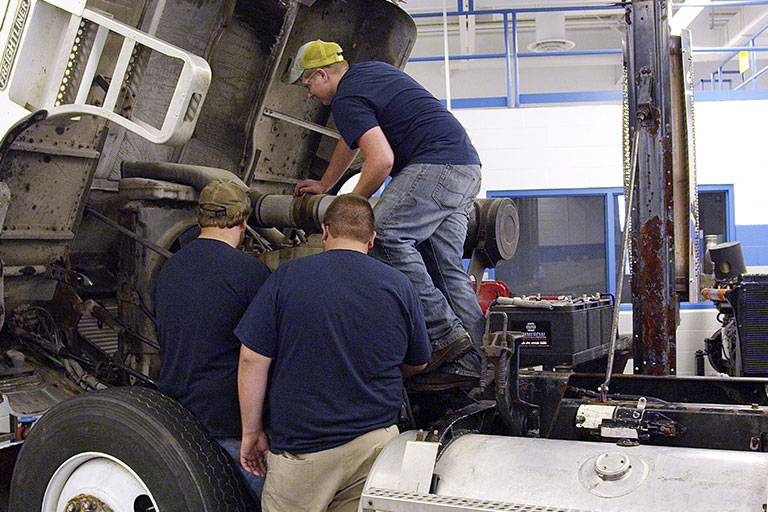Fuel your career with hands-on experience servicing medium and heavy-duty trucks. The trucking industry is growing, along with job opportunities for skilled technicians.
What is Diesel Technology?
Are you a fan of the big rigs? Do you like solving problems and working with your hands? Are you interested in math, science and electronic diagnostics? Becoming a diesel mechanic may be a satisfying career for you! Students learn to operate and repair diesel engines, fuel injection systems, onboard computers, and transmission, steering, suspension and brake systems. We have employers who are ready to hire our students!
The Diesel Technology program is currently located on the Lawrenceburg Campus at 1500 US-127 Lawrenceburg, KY 40342.
The program will be accepting new students for Fall 2025. Students may choose to begin technical training with the Automotive program as some credits will transfer to the Diesel program. Please contact the Coordinator for more information on the Diesel Technology program.

- Medium Truck Technician
- Heavy Truck Technician
- Diesel Engine Mechanic
- Diesel Steering and Suspension Mechanic
- Heavy Duty Brake Mechanic
- Heavy Duty Drive Train Mechanic
- Medium Truck Mechanic Helper
- Heavy Truck Mechanic Helper
Diesel service technicians and mechanics are employed in almost every industry, particularly those that use trucks, buses, and equipment to haul, deliver, and transport materials, goods, and people. The largest employer is the truck transportation industry. Our graduates will be employed by Whayne Supply Company, World Wide Equipment, Kentucky Freightliner, FleetPride, and UPS. Nearly every area of the country employs diesel service technicians and mechanics, although most work is found in towns and cities where trucking companies, bus lines, and other fleet owners have large operations.
Getting Started
What are my degree, diploma, and certificate options?
The catalog describes the course requirements for completing the credential. Students are required to schedule an appointment with their assigned academic advisor to ensure achievement of their academic goals.
- Diesel Engine Mechanic Certificate
- Diesel Steering and Suspension Mechanic Certificate
- Electrical/Electronic Systems Mechanic Certificate
- Fluid Power Mechanic Certificate
- Heavy Duty Brake Mechanic Certificate
- Heavy Duty Drive Train Mechanic Certificate
- Medium and Heavy Truck Mechanic Helper Certificate
- Mobile Air Conditioning Mechanic Certificate
- Preventative Maintenance Mechanic Certificate
How Do I Pay For This?
What Else Do I Need to Know?
Uniform Policy
The Diesel Technology program at Bluegrass Community and Technical College has a mandatory uniform policy. Students are required to adhere to the policy at all times unless otherwise directed by the instructor.
| Subject | Requirements |
|---|---|
| Shirt | Dark blue with a six inch sleeve, collar, and at least three buttons. Shirts must be tucked in and buttoned (with the exception of the top three) at all times. (No name badges or company insignias.) |
| Pants | Dark blue in color. No jeans. Shorts may be worn but must be a dark blue, work style. Pants are to be worn around the waist. |
| Shoes | No requirements, but safety work shoes or boots are recommended. If shoes have strings they must be tied. |
| Belt | Required at all times. No large buckles. |
| Hats | May be worn but must be kept clean. |
| Hair | Long hair must be tied back. |
| Jewelry | Rings, chains, bracelets, facial jewelry, watches, earrings or any other items deemed a safety hazard by the instructor are not permitted. (NO EXCEPTIONS!) |
| Safety Glasses | Students must supply their own eye protection and have it available each day and must have clear lens. Safety glasses must be worn while working in the lab! |
Length of Program
You can complete a certificate in 16 weeks, a diploma in 18 months or and Associate in Applied Science degree in two years if you maintain full-time status.
This information should not be considered a substitute for the KCTCS Catalog. You should always choose classes in cooperation with your faculty advisor to ensure that you meet all degree requirements.

